*/
Are barristers primed and ready to rethink, reshape and future-proof their practice? Might technology be part of the answer, especially when time is already stretched? These questions were examined in A Brave New Bar , a state-of-play report based on research conducted by LexisNexis
Despite a steady decline in the number of cases going to court, legal aid cuts, rising rents and falling fees, the majority of barristers surveyed for A Brave New Bar remain bullish regarding their practice prospects. Nearly three quarters reported their own practice as either stable or growing, compared to three years ago, and two in three believed that they would remain stable or grow in the next three to five years.
Drilling down, 67% of criminal barristers said their practice had grown or remained steady in the last three years – and 58% said they plan to remain steady or grow in the next three to five years. This compares to 78% of civil barristers who said their practice had grown or remained steady in the last three years – and 72% said they plan to remain steady or grow in the next three to five years.
Of the barristers surveyed, on average 92% of their work still comes through solicitors. On direct access, 31 out of the 404 who answered this question said that these instructions accounted for at least 50% or more of their work. Others said they were wary of moving towards direct access because they feared it would jeopardise long-standing relationships with solicitors – and that they would need to spend even more of their already scant time dealing with clients.
Traditionally, received wisdom has always been that it’s better for barristers to specialise than branch out – and the sample reflects that. Of those who said they would like to diversify, 46% said they don’t have the time or support they need to do it. In terms of the best route to a sustainable business, 26% said they thought it was developing a mixed practice and 29% said they weren’t sure. ‘I personally think specialisation is better. However, to survive, diversification is needed.’ ‘The Bar will need to focus more on international work as competition increases for a limited amount of domestic work.’ Finding time to develop business or diversify is another factor, however: ‘Court demands mean there is no time to build new areas of practice.’
One of the main barriers preventing barristers from branching out into new practice areas seems to be lack of cooperation with other barristers from the same set. To support diversification into new practice areas, there are tools that can make it easy to get a quick overview of a particular practice area, and track down the most relevant, up-to-date legislation and cases in a matter of seconds. And for those taking on more direct access work, tools like smart forms and templates can help with tasks that would normally fall to a solicitor.
‘I am a sole practitioner working from my home office when not in court. Increasingly I rely on electronic papers, online research tools, and conduct client and co-counsel meetings and hearings by phone and online. Social media and my website are likely to be important marketing/business development tools in the near future.’
When we asked barristers what support they need to help grow their practice, ‘building/improving marketing’ came out on top (57%). This is another area where technology can help, with tools designed specifically to help barristers in areas like marketing, business development and pricing – areas which many barristers don’t have the training, experience – or interest – in.
It is well documented that managing wellbeing and resilience (aka stress, work/life balance) is one of the most critical challenges for barristers. And according to anecdotal evidence, much of that stress boils down to a lack of time.Growing regulations, rising costs and falling fees all mean there’s less time for barristers to focus on advocacy. Investing in tools to automate simple tasks or speed up research time isn’t just about saving time and money, but alleviating stress, improving work satisfaction, and freeing up time to spend on the parts of the job they’re passionate about.
Nearly 30% cited delays in receiving fees in publicly funded cases in their top three most critical challenges – and roughly the same number (33%) rated delays in receiving fees in private cases in their top three: ‘It is incredible that aged debt is an accepted reality in this profession. If a builder or plumber was not paid within 28 days, it would be seen as completely unacceptable.’ ‘There is a lot of publicity given to Wellbeing at The Bar but if we all received payment within 30 days this would alleviate one of the biggest wellbeing problems.’
From new rules around data protection and money laundering, to HMRC’s ‘Making Tax Digital’ regime for VAT, around 28% of the barristers surveyed also rated increasing regulations in their top three most critical challenges. All the extra time involved in keeping up with the latest changes and dealing with the extra admin and paperwork inevitably means there’s less time to focus on clients, let alone ‘luxuries’ like business development: ‘Increased regulation makes it hard for small sets with limited resources expected to do the same as large sets with huge support teams.’
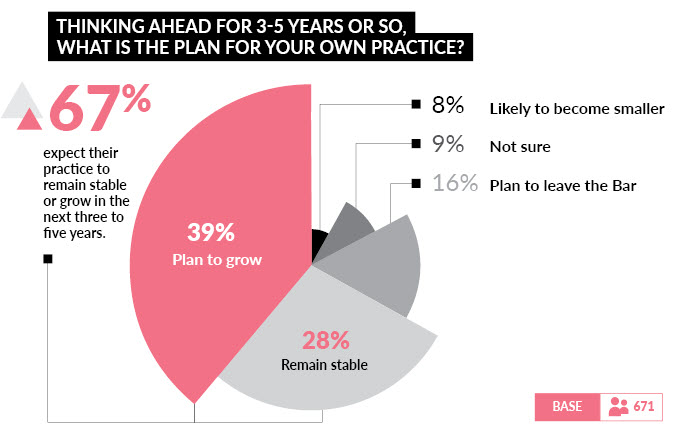
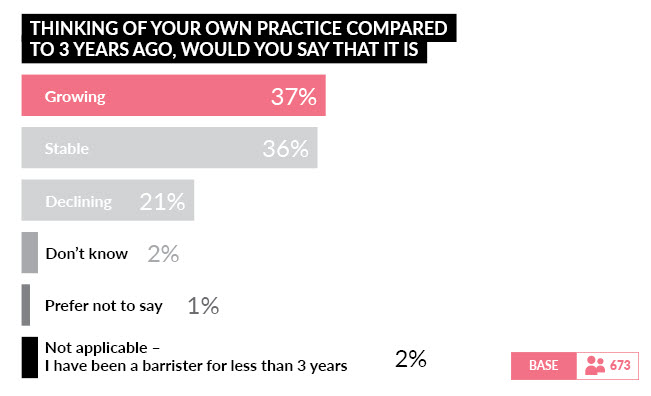
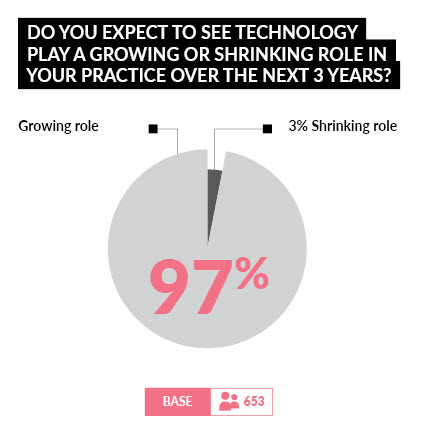
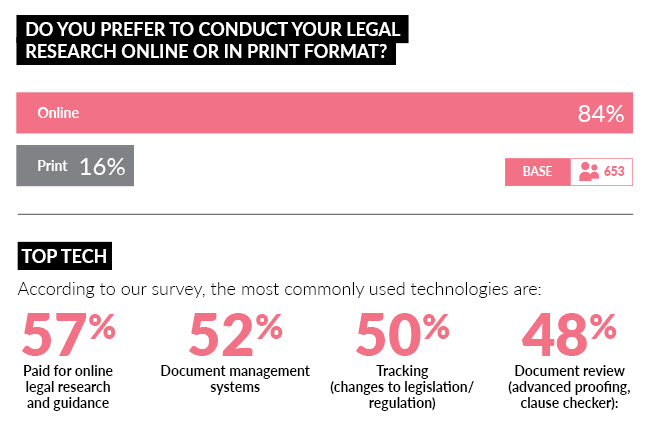
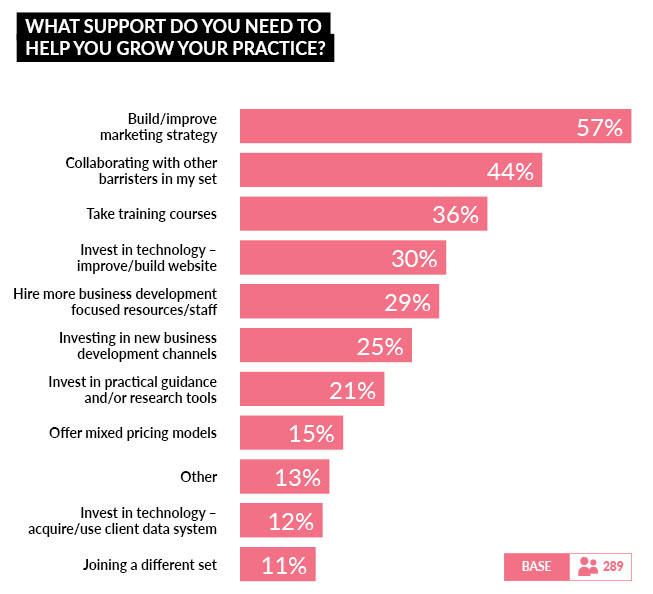
Despite a steady decline in the number of cases going to court, legal aid cuts, rising rents and falling fees, the majority of barristers surveyed for A Brave New Bar remain bullish regarding their practice prospects. Nearly three quarters reported their own practice as either stable or growing, compared to three years ago, and two in three believed that they would remain stable or grow in the next three to five years.
Drilling down, 67% of criminal barristers said their practice had grown or remained steady in the last three years – and 58% said they plan to remain steady or grow in the next three to five years. This compares to 78% of civil barristers who said their practice had grown or remained steady in the last three years – and 72% said they plan to remain steady or grow in the next three to five years.
Of the barristers surveyed, on average 92% of their work still comes through solicitors. On direct access, 31 out of the 404 who answered this question said that these instructions accounted for at least 50% or more of their work. Others said they were wary of moving towards direct access because they feared it would jeopardise long-standing relationships with solicitors – and that they would need to spend even more of their already scant time dealing with clients.
Traditionally, received wisdom has always been that it’s better for barristers to specialise than branch out – and the sample reflects that. Of those who said they would like to diversify, 46% said they don’t have the time or support they need to do it. In terms of the best route to a sustainable business, 26% said they thought it was developing a mixed practice and 29% said they weren’t sure. ‘I personally think specialisation is better. However, to survive, diversification is needed.’ ‘The Bar will need to focus more on international work as competition increases for a limited amount of domestic work.’ Finding time to develop business or diversify is another factor, however: ‘Court demands mean there is no time to build new areas of practice.’
One of the main barriers preventing barristers from branching out into new practice areas seems to be lack of cooperation with other barristers from the same set. To support diversification into new practice areas, there are tools that can make it easy to get a quick overview of a particular practice area, and track down the most relevant, up-to-date legislation and cases in a matter of seconds. And for those taking on more direct access work, tools like smart forms and templates can help with tasks that would normally fall to a solicitor.
‘I am a sole practitioner working from my home office when not in court. Increasingly I rely on electronic papers, online research tools, and conduct client and co-counsel meetings and hearings by phone and online. Social media and my website are likely to be important marketing/business development tools in the near future.’
When we asked barristers what support they need to help grow their practice, ‘building/improving marketing’ came out on top (57%). This is another area where technology can help, with tools designed specifically to help barristers in areas like marketing, business development and pricing – areas which many barristers don’t have the training, experience – or interest – in.
It is well documented that managing wellbeing and resilience (aka stress, work/life balance) is one of the most critical challenges for barristers. And according to anecdotal evidence, much of that stress boils down to a lack of time.Growing regulations, rising costs and falling fees all mean there’s less time for barristers to focus on advocacy. Investing in tools to automate simple tasks or speed up research time isn’t just about saving time and money, but alleviating stress, improving work satisfaction, and freeing up time to spend on the parts of the job they’re passionate about.
Nearly 30% cited delays in receiving fees in publicly funded cases in their top three most critical challenges – and roughly the same number (33%) rated delays in receiving fees in private cases in their top three: ‘It is incredible that aged debt is an accepted reality in this profession. If a builder or plumber was not paid within 28 days, it would be seen as completely unacceptable.’ ‘There is a lot of publicity given to Wellbeing at The Bar but if we all received payment within 30 days this would alleviate one of the biggest wellbeing problems.’
From new rules around data protection and money laundering, to HMRC’s ‘Making Tax Digital’ regime for VAT, around 28% of the barristers surveyed also rated increasing regulations in their top three most critical challenges. All the extra time involved in keeping up with the latest changes and dealing with the extra admin and paperwork inevitably means there’s less time to focus on clients, let alone ‘luxuries’ like business development: ‘Increased regulation makes it hard for small sets with limited resources expected to do the same as large sets with huge support teams.’





Are barristers primed and ready to rethink, reshape and future-proof their practice? Might technology be part of the answer, especially when time is already stretched? These questions were examined in A Brave New Bar, a state-of-play report based on research conducted by LexisNexis


The Chair of the Bar sets out how the new government can restore the justice system
In the first of a new series, Louise Crush of Westgate Wealth considers the fundamental need for financial protection
Unlocking your aged debt to fund your tax in one easy step. By Philip N Bristow
Possibly, but many barristers are glad he did…
Mental health charity Mind BWW has received a £500 donation from drug, alcohol and DNA testing laboratory, AlphaBiolabs as part of its Giving Back campaign
The Institute of Neurotechnology & Law is thrilled to announce its inaugural essay competition
How to navigate open source evidence in an era of deepfakes. By Professor Yvonne McDermott Rees and Professor Alexa Koenig
Brie Stevens-Hoare KC and Lyndsey de Mestre KC take a look at the difficulties women encounter during the menopause, and offer some practical tips for individuals and chambers to make things easier
Sir Geoffrey Vos, Master of the Rolls and Head of Civil Justice since January 2021, is well known for his passion for access to justice and all things digital. Perhaps less widely known is the driven personality and wanderlust that lies behind this, as Anthony Inglese CB discovers
The Chair of the Bar sets out how the new government can restore the justice system
No-one should have to live in sub-standard accommodation, says Antony Hodari Solicitors. We are tackling the problem of bad housing with a two-pronged approach and act on behalf of tenants in both the civil and criminal courts